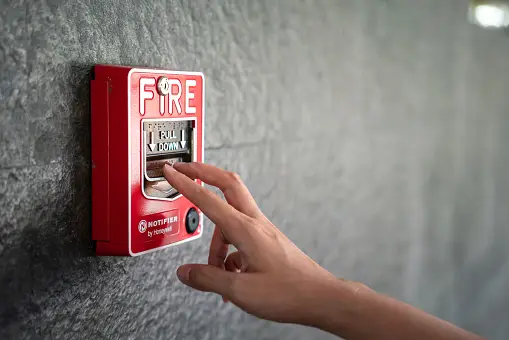Fire Security Measures for Businesses: Essential Tips for Protecting Your Property and Employees
Fire safety measures are essential for any business, regardless of its size or industry. A fire can cause significant damage to a business, resulting in financial losses, injuries, and even fatalities which makes fire detection more important. Therefore, implementing fire security and safety measures should be a top priority for any business owner.
Table of Contents
What is fire safety and security?
Importance of Fire Safety Measures
One of the most important reasons for implementing fire safety measures is to protect the lives of employees, customers, and visitors. In the event of a fire, people’s lives are at risk, and fire safety measures can help prevent or minimize injuries or fatalities. Fire safety measures can include smoke detectors, fire alarms, fire extinguishers, sprinkler systems, and emergency evacuation plans.
Another reason why fire safety measures are important is to protect a business’s assets. A fire can destroy a business’s physical assets, such as equipment, machinery, inventory, and buildings. This can result in significant financial losses, which can be devastating for a business. Implementing fire safety measures can help prevent or minimize property damage in the event of a fire.
In addition to protecting lives and assets, fire safety measures can also help a business comply with legal requirements and regulations. Many jurisdictions require businesses to implement fire safety measures, and failure to comply can result in fines, penalties, and legal liabilities.
Fire Security and Safety Regulations for Businesses
Fire safety regulations for businesses are in place to ensure that all employees and customers are safe in the event of a fire. These regulations are set by the government and must be followed by all businesses. Failure to comply with these regulations can result in fines or even the closure of the business.
The regulations cover a wide range of topics including fire prevention, detection, and suppression. Businesses must have fire prevention measures in place such as regular maintenance of electrical equipment and proper storage of flammable materials. Smoke detectors and fire alarms must be installed and tested regularly to ensure they are in working order.
In addition to prevention measures, businesses must also have a plan in place in case of a fire. This includes designated evacuation routes, fire extinguishers, and training for employees on how to respond in an emergency. Regular fire drills must also be conducted to ensure everyone knows what to do in case of a fire.
Businesses must also comply with building codes and regulations related to fire safety. This includes proper installation of fire doors and sprinkler systems. All exits must be clearly marked and unobstructed to ensure a quick and safe evacuation in case of a fire.

Fire Detection and Warning Systems
Fire detection and warning systems are crucial components of any business’s fire security measures. These systems are designed to detect the presence of fire and alert occupants of the building, allowing them to evacuate safely and quickly.
There are several types of fire detection systems available, including smoke detectors, heat detectors, and flame detectors. Smoke detectors are the most common type of fire detection system, as they are highly effective at detecting the presence of smoke, which is often an early indicator of fire.
Heat detectors are another type of fire detection system that detect changes in temperature for fire security. They are particularly effective in areas where smoke detectors may not be suitable, such as kitchens or areas with high levels of dust or steam.
Flame detectors are the most advanced type of fire detection system, as they are designed to detect the presence of flames. They are particularly useful in areas where fires may start quickly, such as chemical storage areas.
In addition to fire detection systems, businesses should also have fire warning systems in place. These systems alert occupants of the building of a fire, allowing them to evacuate quickly and safely. Fire warning systems can include alarms, sirens, and strobe lights.
It is important to ensure that fire detection and warning systems are working to ensure their effectiveness in the event of a fire. Regular testing and maintenance of these systems should be conducted to ensure that they are in good working condition.
What are the 3 main types of fire alarm?
The three main types of fire alarm systems are:
- Conventional Fire Alarm Systems: These divide a building into zones, and when a detector is triggered, it identifies the general area where the fire is located.
- Addressable Fire Alarm Systems: Each detector or device has a unique address, allowing for specific identification of the location of a fire or fault.
- Wireless Fire Alarm Systems: These use wireless communication to connect the detectors, eliminating the need for extensive wiring and allowing for flexible installation in existing buildings.
Fire Fighting Equipment and Maintenance
Firefighting equipment is an essential element in any business’s fire safety and security. It is critical to have the right equipment on hand to extinguish a fire quickly and efficiently. Regular maintenance of the equipment is also crucial to ensure it is in good working condition.
Businesses should have a fire extinguisher in every room, and the extinguishers should be in easily accessible locations. It is also important to ensure that the extinguishers are appropriate for the type of fire that could occur in that room. For example, a Class A fire extinguisher is suitable for fires that involve wood, paper, or cloth. While a Class B extinguisher is appropriate for fires involving flammable liquids.
Aside from fire extinguishers, businesses should also have fire hoses and sprinkler systems installed. The fire hoses should be inspected regularly to ensure they are in good condition and ready for use. The sprinkler systems should also be inspected and tested regularly to ensure they are in working order.
Businesses should also have a fire alarm system installed. The system tests should ensure it is functioning correctly. The alarm should be loud enough to alert everyone in the building, and it should be connected to a monitoring service that can notify the fire department in case of an emergency.
Conclusion on Fire Security
In conclusion, businesses must take fire safety seriously to protect their employees, customers, and assets. By implementing the appropriate fire security measures, businesses can prevent fires from occurring, detect fires early, and minimize the damage caused by fires.
Businesses must develop a comprehensive fire safety plan that includes fire prevention, detection, and suppression strategies. This plan should be up to date to ensure that it remains effective and relevant.
Businesses should also invest in fire safety equipment such as fire alarms, fire extinguishers, and sprinkler systems. These devices can help to detect fires early and suppress them before they cause significant damage.
Furthermore, businesses should educate their employees on fire safety procedures and conduct regular fire drills to ensure that everyone knows what to do in case of a fire.
Overall, fire safety and security is an essential aspect of business operations, and businesses must take the necessary steps to protect themselves and others from the devastating effects of fires.

Business Developmeny Manager at PAS InfoCom Technologies Ltd. Experienced in project management with a demonstrated history of working in the information technology and services industry.











